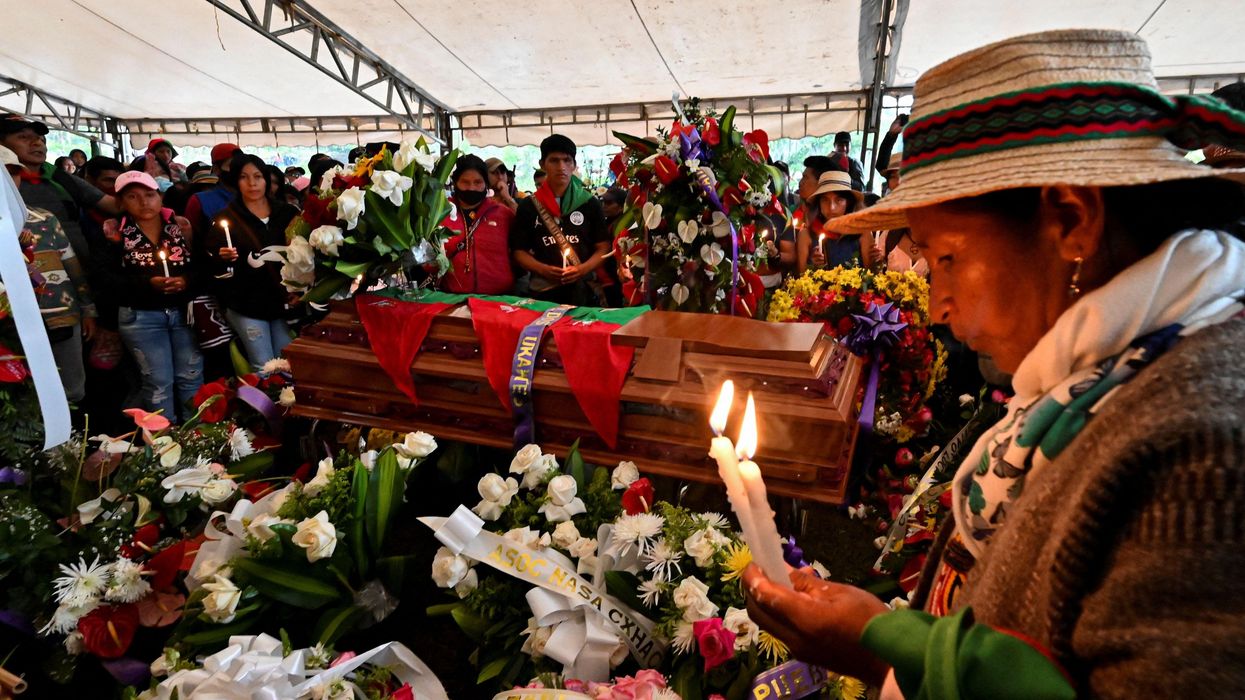Twenty-seven oil and three gas blocks are scheduled to be auctioned off to the highest bidding corporations on July 28 and 29. The roughly 11 million hectares of land up for grabs in the Congo Basin--whose rainforest trails only the Amazon in size and is more intact--include parts of Virunga National Park, home to a key gorilla sanctuary, as well as tropical peatlands that prevent massive amounts of planet-heating carbon from reaching the atmosphere.
"If oil exploitation takes place in these areas, we must expect a global climate catastrophe, and we will all just have to watch helplessly," Irene Wabiwa, international project leader for Greenpeace Africa's Congo Basin forest campaign in Kinshasa, told the New York Times on Monday.
Greenpeace Africa on Monday submitted a petition with more than 100,000 signatures urging DRC President Felix Tshisekedi to halt the sale of land--"home to thousands of local and indigenous communities and countless animal and plant species"--to Big Oil.
"Sacrificing peatlands and protected areas in the Congo Basin forest," the group tweeted, would be "a death blow to the Paris agreement," which seeks to limit global warming to 1.5oC over preindustrial levels. "It's madness. These plans must be scrapped immediately."
The DRC's approval of new oil and gas drilling in the region comes eight months after Tshisekedi endorsed a 10-year agreement to protect the country's rainforest--a major repository of biodiversity and the world's largest terrestrial carbon sink--at the United Nations' COP26 climate summit in Glasgow last December.
The deal to curb deforestation included pledges of $500 million for the DRC over the first five years. But since Russia's invasion of Ukraine and the ensuing sanctions threw global energy markets into chaos, the DRC has watched as Norway--a leading proponent of forest conservation--advanced plans to expand offshore oil drilling and U.S. President Joe Biden, a self-styled climate leader, begged Saudi Arabia to boost oil production.
The DRC "has taken note of each of these global events," the Times reported, citing Tosi Mpanu Mpanu, the nation's top representative on climate issues and an adviser to the minister of hydrocarbons. "Congo's sole goal for the auction, he said, is to earn enough revenue to help the struggling nation finance programs to reduce poverty and generate badly needed economic growth."
"That's our priority," Mpanu told the newspaper in an interview last week. "Our priority is not to save the planet."
As the Times noted:
The auction highlights a double standard that many political leaders across the African continent have called out: How can Western countries, which built their prosperity on fossil fuels that emit poisonous, planet-warming fumes, demand that Africa forgo their reserves of coal, oil, and gas in order to protect everyone else?
And it raises a question asked by many communities whose very survival is based on cutting trees for sale or for cooking fires: If they protect carbon stocks of incalculable value to the whole world, what do they get in return?
"Maybe it's time we get a level playing field and be compensated," Mr. Mpanu said.
Many Congolese officials believe that after decades of colonialism and political mismanagement, their country's needs should be prioritized against those of the world.
"There are no words that can adequately describe this catastrophe," researcher Joey Ayoub lamented, referring to the impending auction--first approved in April and nearly doubled in size last week to 30 blocks, up from the initially proposed 16.
"The polluting Global North countries are refusing to transition away from fossil fuels and countries like the DRC are left to fend for themselves," Ayoub wrote on Twitter.
Mpanu contended that the refusal of rich nations to adequately compensate poor countries for not exploiting natural resources leaves policymakers in the Global South with few good options for economic development.
That argument was echoed by others on social media, who highlighted the case of Ecuador. In 2007, then-President Rafael Correa "set up a trust fund that the international community could finance to stop the country from exploring an oil block in the Yasuni National Park, one of the most biodiverse regions in the world," the Times reported. "The goal was to raise around $3.6 billion. Years later, it had only raised $13 million. So in 2013, the government decided to allow oil exploration. Drilling began three years later."
The estimated monetary value of the DRC's buried fossil fuels won't be known until highly destructive seismic surveys are conducted. But hydrocarbons minister Didier Budimbu said in May that the DRC has the potential to expand its oil production from the present level of 25,000 barrels per day to 1 million, the Times noted. At current prices that would amount to $32 billion per year, more than half of the impoverished nation's GDP.
"We have a primary responsibility toward Congolese taxpayers who, for the most part, live in conditions of extreme precariousness and poverty, and aspire to a socio-economic wellbeing that oil exploitation is likely to provide for them," Budimbu told The Guardian this past weekend.
Budimbu has spoken with some of Africa's major oil producers, including Angola, Nigeria, and Equatorial Guinea, "so that the DRC can take the same path," according to a recent statement on the ministry's website.
"The oil must be kept in the ground around the world, including in DRC."
History has shown that the overwhelming majority of people in the DRC are unlikely to benefit from increased fossil fuel production, as the working-class residents of neighboring nations have borne almost all of the costs of extraction while multinational corporations and a small minority of local elites capture the profits.
Already, the mining of cobalt and lithium--minerals that are crucial to the green energy industry--has failed to improve living conditions in the DRC, as Faustin Nyebone from AICED (Support for Community Initiatives for Environmental Conservation and Sustainable Development) pointed out on Monday.
"The DRC lacks no resources to boost its economy and improve the living conditions of Congolese people," Nyebone said in a statement. "The country is ranked 182 in good governance, while its population lives on less than $1 a day even in the town of Walikale, where cobalt is mined."
Justin Mutabesha of the Association des Jeunes Visionnaires RDC echoed that sentiment.
"With the auction of oil blocks, local communities are taken hostage by politico-economic elites," said Mutabesha. "Congolese oil will mean the disappearance of immense parts of the biodiversity which 100 million people depend on for fishing, agriculture, and other traditional practices. It also means the ongoing neglect of alternatives to renewable energies. We say no to this sale."
Joe Eisen, executive director of Rainforest Foundation U.K., said that "while DRC's development needs are very real, there is little to suggest that oil and gas revenues would be used for the public good rather than the personal enrichment of political elites. Instead, we urge the government and its international partners to keep fossil fuels in the ground and trees standing by working with local and indigenous communities who depend on these areas."
Last week, a team of forest campaigners from Greenpeace Africa collected testimonies from people living in four of the proposed oil blocks.
They "were all shocked about the prospective auction of their lands to oil companies," according to Greenpeace. "Some communities, such as those living around the Upemba National Park, see the prospective oil exploration as a direct threat to the lake they rely on for generations and are planning to resist it."
As corporations move ahead with plans to expand oil and gas production across Africa--despite warnings that doing so is "not compatible with a safe climate future"--environmental justice advocates have sought to break down the false narrative that economic development depends on fossil fuel extraction, arguing that it is possible to build more prosperous and egalitarian societies powered by renewable energy.
"Look for money elsewhere and don't pollute our planet."
"The international community and the Congolese government must end the neocolonial scramble for African fossil fuels by restricting oil companies' access to the DRC, focusing instead on ending energy poverty through supporting clean, decentralized renewable energies," Wabiwa said last week.
Marianne Klute, chairwoman of Rettet den Regenwald/Rainforest Rescue called the DRC's plans "shocking."
"As the world is facing a mass extinction of animal and plant species and a climate emergency, DRC's government is about to trigger an environmental bomb that also threatens the livelihood of millions of people who depend on Congo's forests," she said on Monday. "The oil must be kept in the ground around the world, including in DRC."
Isaac Mumbere of the Reseau CREF RDC emphasized that "nothing can justify this environmental crime."
"Look for money elsewhere and don't pollute our planet," Mumbere added.
In March, Eve Bazaiba, the DRC's minister of environment, told the Times that officials were still considering their options. "Should we protect peatland because it's a carbon sink or should we dig for oil for our economy?" she asked.
Last week, Bazaiba indicated a willingness to stop the auction.
"If we have an alternative to the oil exploitation, we'll keep them," she tweeted, alluding to the peatlands that store three years' worth of global carbon emissions.





